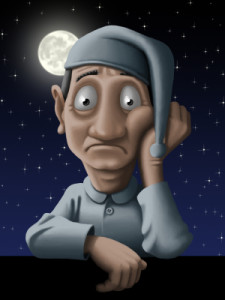The question of trying out a natural sleep aid treatment for patients of chronic insomnia (lack of sleep) is not a new idea. In fact the various negative impacts that may arise from lack of sleep alone are enough reason to consider natural options to remedy the problem.
By natural, this has often been misconceived for using plant based ingredients in the pharmaceutical drugs used in addressing insomnia. However, cognitive behavior therapy for insomnia (CBT-i) does not rely on any medication and there are no drugs used at all. After the stunning results that indicated this approach is just as effective in treating chronic insomnia as the conventionally approved and accepted drugs (benzodiazepines, Ambien, Lunesta…), many victims of the condition may consider CBT-i.
What is CBT-i?
In order to understand the concept of cognitive behavior therapy used in addressing insomnia, it is first important to discern the condition and the root causes. The lack of sleep can be caused by several factors that range from stress and discomfort to poor diet habits and sleeping practices, illnesses and other less clear reasons. However, the main cause of insomnia is generally viewed as disturbance in the brain that causes a constant state of wakefulness and the more aware the victim is of their wakefulness, the less likely they are able to achieve efficient sleep. COBT-i is a natural recovery therapy offered without the use of any drugs and addresses the root cause of insomnia. This therapy is administered in 5 main phases as follows;
• Phase 1– This involves the doctor prompting victims to lay out the negative beliefs and feelings about sleep that may lead to insomnia. These include fear of not falling asleep or getting enough sleep and irritations. The doctor then advices why these feelings do not help and offers alternatives that can be used to establish a “sleepy” attitude in bed.
• Phase 2 – This is known as stimulus control and the therapist basically helps the victims maximize their association of the bed with sleeping. This includes advising against stimulating activities and behaviours that may increase wakefulness in the bed.
• Phase 3 – This simply involves advices that are aimed at helping the victim minimize wakefulness when in bed. Insomnia patients are advised to go to bed only when they feel sleepy to avoid the negative feelings that arise when you cannot fall asleep.
• Phase 4 – This phase involves offering recommendations that will help victims achieve healthy sleep patterns and hygiene. This includes sleeping in clean environments (with no pests and distractions) that promote sound sleep and avoiding daytime naps as well as night caffeinated drinks.
• Phase 5 – This final phase involves advice about relaxation techniques like meditation and mindfulness that can be pursued to slow down brain activity and allow sleep to kick in.
From the five phases, CBT-i addresses the root core of insomnia and provides alternative natural methods of avoiding circumstances that will lead to this condition. It is based on the vicious cycle (spiralling) which explains how the negative feelings and self-destructive behaviours often lead to other feelings and worse behaviours that ultimately cause chronic insomnia. Although pharmaceutical medication such as those mentioned above have been proven to treat the condition, it is also well documented tat they can lead to chemical and psychological dependence on the drug. Those suffering chronic insomnia will also soon develop resistance which only worsens the condition since you now have to increase the dosage opening up to more side effect impacts.
CBT-I research statistics
Cognitive behaviour therapy for insomnia has been researched and proven to be a functional natural sleep aid. A systematic Meta analysis of research studies done on the effectiveness of CBT-I was recently undertaken by physicians at the MSDC (Melbourne Sleep Disorders Center). The study was done on actual results obtained from the therapy as well as a review of books and materials published by various authors on the subject. In general representation, CBT-i resulted in patients falling asleep 19 minutes earlier, sleeping 26 more minutes in sound sleep (without waking up in the middle of the night) slept 7.6 more minutes and had their sleep efficacy improved by 10%. They concluded that CBT-i is just as effective as the pharmaceutical drugs albeit without any side effects of dependence and resistance.
Conclusion
While the statistical amount of sleep time seemed insignificant, sleep efficacy (quality and effectiveness) was very important and the result corresponds what studies done on medication drugs have yielded. The results of the studies were well documented in the Annals of Internal Medicine in June 8 and can be checked for further elaboration of CBT-i efficacy.

